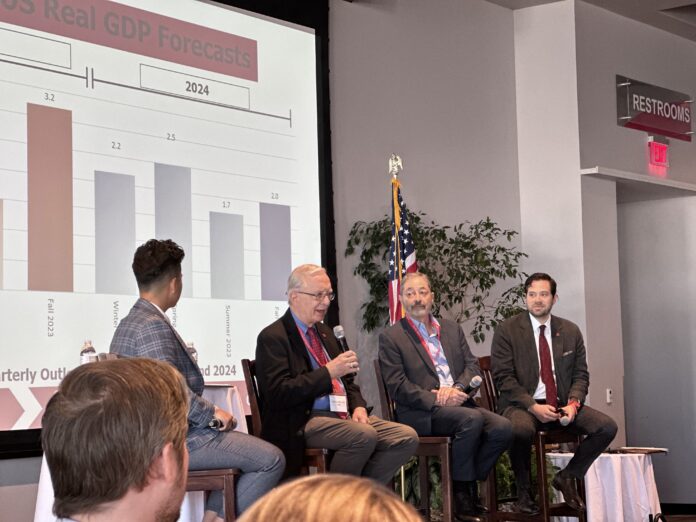
The economic health of the Las Vegas community has constantly evolved due to its adaptation of new technologies, solutions and initiatives.
Las Vegas has evolved in various fields and economic sectors, and while the start of F1 and other local projects are imminent, evaluating the state of the Southern Nevada community has been a top priority for local partners.
The UNLV Center for Business and Economic Research (CBER) hosted the 29th biannual Economic Outlook at the Thomas & Mack Strip View Pavilion. The event addresses the state of the local economy and invites community leaders to lead discussions into identifying issues that need to be resolved.
The program included Karen Chapple, Ph.D. as the keynote speaker, followed by two consecutive panel discussions. Chapple opened up the event by discussing the post-pandemic recovery of downtown areas and how the implications of remote work have lagged the full recovery of city centers. Following the presentation, director of CBER, Andrew Woods hosted a Q&A session with Chapple. “I do think we should double down on downtowns,” Chapple explained. “In Las Vegas, we have huge potential for development. There’s talk of tech parts and so forth … but for talent, we need those downtowns.”
The first panel, consisting of David Swallow (Deputy Chief Executive Officer for RTC), Molly Kinder (fellow at Brookings Metro) and Brian Knudsen (city councilman for City of Las Vegas), explored the adjustments in transport systems in the Las Vegas valley and how the shifting populations will require adequate changes to transportation methods. The final panel consisted of Woods, Stephen Miller (Director of Research at CBER) and John Restrepo (principal of Las Vegas-based RCG Economics), in which they discussed the recent changes in economic conditions, particularly consumer prices, and how they continue to further impact the rate of economic development in the Southern Nevada community. The event concluded with Woods awarding Miller a commendation from Sen. Catherine Cortez Masto and Rep. Steven Horseford, commemorating his commitment to economic development and study.
“The goal has always been to provide the most current and accurate data and forecasts that will shape important business and community decisions for the coming years,” Woods highlighted.
“Outlook provides an open forum for the public and our leaders to learn and ask questions,
get up to speed on current economic events, better understand the challenges and
opportunities facing our growing community, and what to expect in the coming year. We
learn just as much from our audience as they learn from us, since it is an exchange of ideas.”
Woods went on to further state: “We rotate topics beyond just our traditional discussion of our forecasts for the U.S. and Southern Nevada economies. We fly in national experts from academia, business, the Federal Reserve and governments to come and present their own views and provide relevant information on these various topics. Nowhere else in town will you find a more informative discussion compacted into two hours.”
The event brought in various sponsors from around the Las Vegas community to not only provide their open support, but also bring a level of connectivity to the economic growth of the city. Sponsors and partners of the event included Wynn Resorts, Southwest Gas, Whittier Trust, NV Energy, PNC Bank, RTC, City of Las Vegas, City of Henderson, AGEM, Clark County Economic Development, Latin Chamber of Commerce, Sunrise Health, VI, NRM and Nevada Bankers Association. The goal of the event also attracted more awareness about the current conditions in the Southern Nevada community, along with various ways certain challenges can be addressed.
“This event really helped me become more aware and knowledgeable about the current state of Southern Nevada and its economy, and that’s what I believe other students could get out of this event as well,” said Madison Motoyama, a senior undergraduate faculty assistant at CBER.
“Outlook is essential to the growth and development of UNLV and the greater Las Vegas area because it helps educate our community, whether that is our students and facility or business professionals. This event allows us to reflect on the growth of Southern Nevada, as well as evaluating and identifying points of weakness within our economy and what we could be doing better,” Motoyama concluded.
Students looking to get involved with CBER can volunteer to help for events, in which attendance is free. Event ticket prices for non-volunteer students average between $5 and $25. Those interested in working at CBER do not need to be economics majors to get involved but must hold a high commitment to learning and significant problem solving skills. Interested students can contact Daniela Rincon-Cornejo at cber@unlv.edu.
